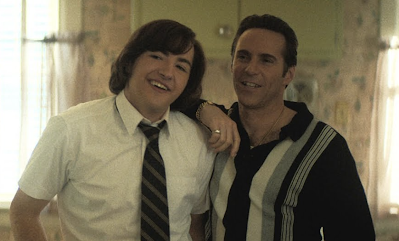The Many Saints Of Newark
directed by Alan Taylor
directed by Alan Taylor
The Many Saints of Newark (TMSOM) is a prequel to the HBO crime drama series The Sopranos. The Sopranos creator, David Chase, produced and wrote, but did not direct this film. With prequels, unless there is some undetailed and exciting narrative that improves the original story, audience interest can flag.
The audience already knows what happened to the major characters in the original story. Skilled creators can find ways around that.
Instead of examining the young adult Tony Soprano who will become the intimidating (and depressed) boss of the DiMeo Crime Family, TMSON focuses on Tony's mentor, his uncle by marriage, Dickie Moltisanti (Alessandro Nivola), whose translated surname provides part of the film's title and serves as a indicator of the struggle between good and evil that lives in his heart.
Less successfully TMSON also tries to say something about race, by introducing the character Harold McBrayer (Leslie Odom Jr). A Black gangster who was a high school schoolmate (and football teammate?) of Dickie's, Harold now works for Dickie overseeing numbers and gambling rackets in inner city Newark. And I do mean "overseeeing".
The Newark rackets belong to the Mafia, personified by Dickie. Harold is upset that he's he's doing most of the work and taking all the risk while Dickie and friends make all the money. This can't continue.
Although arguably many white ethnic groups became "white" in part by distancing themselves from Black people, it's true that say compared to Jewish-Americans, Italian-Americans (with honorable exceptions noted) cultivated a reputation for more open hatred against Black-Americans.
This is a shame and also somewhat ironic (as an Italian-American friend of mine once noted) because many of the stereotypes associated with Black Americans and Italian-Americans were almost exactly the same: over the top displays of aggressive masculinity, good dancers, loud, wear lots of jewelry, criminally minded, flamboyance, physically imposing, quick to violence, sexually driven, etc..
When Spike Lee examined some of this in Do The Right Thing, some people accused him of maliciousness towards Italian-Americans, which was obviously not his intent. Here Chase works the same side of the street. With few exceptions, the Italian-Americans in TMSON do not like Black Americans. And they are not shy about saying so. At all.
Although Dickie does not constantly spew slurs or make plantation jokes in front of Harold, when angered he's no different from his buddies.
Perhaps because Chase is Italian-American and took some of The Sopranos/TMSON vibe from his own life experiences, people will be less critical of his artistic choices.
Similar to The Sopranos, TMSON drips with Freudian imagery and overtones.
In 1967 shortly before the Newark riots, Dickie Moltisanti welcomes home his father Hollywood Dick (Ray Liotta) and his father's new Italian bride, Giuseppina (Michela De Rossi).
The young Tony Soprano attends this homecoming along with his racist hot tempered father Johnny Soprano (Jon Bernthal) and Uncle Junior (Corey Stoll), each of whom outranks Dickie in the mob hierarchy, though Dickie is a better earner. Giuseppina is an audaciously attractive woman who is younger than Dickie. Dickie has trouble viewing her as a stepmother.
Dickie might have just wrestled with his inappropriate thoughts and never said or done anything were it not for the unfortunate fact that Dickie's father likes beating women. This includes Giuseppina. As a child Dickie was too young to do anything about it when his father abused his mother. But Dickie's a full grown man and mob killer now.
The elder Moltisanti's corpse is found smoldering in a Newark shop (it must have been those damn blacks who did it) and Dickie takes his father's widow as his mistress.
Ashamed of this most unBiblical behavior Dickie starts visiting his imprisoned uncle and father's twin brother Sally Moltisanti (also Ray Liotta) to make amends while also never admitting anything.
This relationship echoes the one which Tony Soprano would have with his psychiatrist in The Sopranos.
Can good acts outweigh bad ones? Does committing a bad act mean that you are bad altogether? Dickie is self-aware enough to be concerned about this, particularly because he knows that his nephew Tony worships him.
Johnny Soprano is in and out of prison. His wife Livia (Vera Farmiga in excellent casting) wants Dickie to take more of a paternal role with the teen Tony (Michael Gandolfini playing the young version of the character his father James Gandolfini made famous).
Giuseppina proves to be more independent than Dickie expected. Harold has plans that do not include working for whites. And Uncle Junior, whom Sopranos fans will remember as a resentful man, is angry that in Johnny's absence Livia and especially Tony seek guidance from Dickie and not him.
This movie was intermittently entertaining. But there's not enough to explain why in crime, as in larger society, the previous demeaning relationships between Blacks and Whites were starting to break down. Harold needed more screen time. The clothes, cars, settings, and cinematography all give that late sixties/early seventies feel.
TMSON should have been an HBO miniseries. There's too many good performances without enough story to support them. Characters needed more time and room to breathe. TMSON is occasionally narrated by a character from The Sopranos who dies in that series and was not yet born when this film begins. TMSON has an elegiac feeling.




